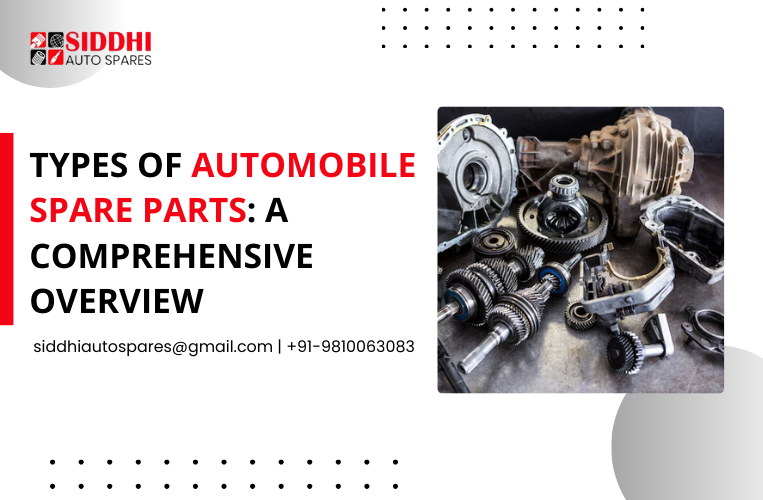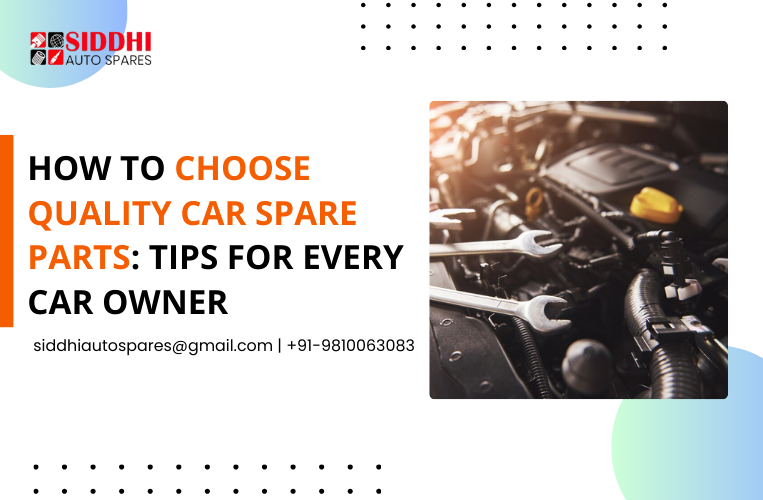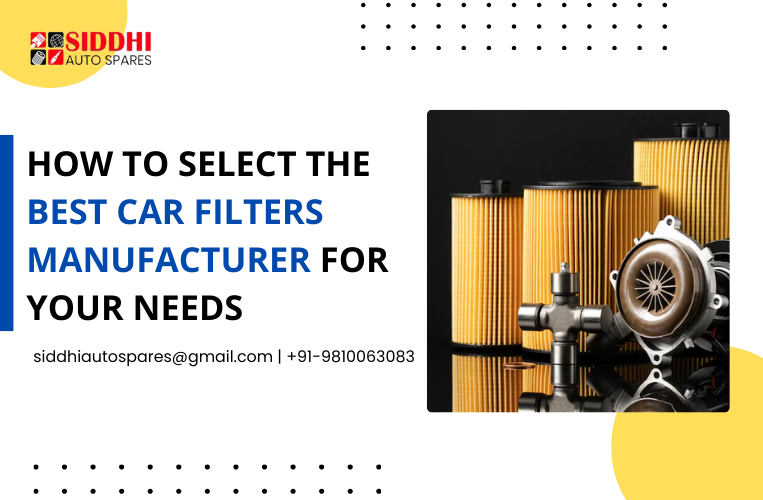When it comes to the maintenance of a car, one's mind immediately runs to the engine, tyres, and fuel. But there's also another dutiful ace operating in the background that keeps the entire operation on the road—filters. These tiny but mighty chunks of machinery are charged with maintaining the cleanliness of the engine, providing free and smooth air intake, cleaning air within the cabin, and fuel quality.
But the catch is—what do you do when the original filter component isn't available or is too costly? You cross-reference it. That is, you find another filter from a different brand that matches your original in function and form.
We know at Siddhi Auto Spares how irritating it becomes to postpone servicing or repair because of the unavailability of products. So, we assist customers in cross-verifying filters correctly—be it Tata, Eicher, Mahindra, AMW, or Ashok Leyland trucks. Here, is a step-by-step guide that will update you on the process, prevent errors, and enable you to make intelligent buying choices.
What is Filter Cross-Referencing?
Filter cross-referencing is the process of matching an existing filter’s specifications with a compatible alternative from another brand. This is done to ensure that the replacement works just as efficiently as the original.
For example, if you're maintaining a Tata truck and the OEM fuel filter is out of stock, you can look up a Mahindra or aftermarket filter that has the same flow rate, size, and filtration efficiency.
This process allows you to:
Save time and avoid delays in service
Reduce maintenance costs
Keep your operations running smoothly
Choose filters from trusted aftermarket suppliers
Siddhi Auto Spares regularly helps clients across India with accurate filter alternatives using verified technical data and expert product knowledge.
Why Cross-Referencing is Increasingly Important
Cross-referencing filters was once limited to experienced mechanics and dealers. But today, it's becoming essential knowledge for:
Fleet managers
Garage owners
Spare parts retailers
Everyday vehicle owners
Here’s why:
OEM filter shortages do happen, particularly in tier-2 or rural areas.
With aftermarket filters now having equal quality and cost, they are the wiser option.
Phased-out models or imported vehicles may no longer be able to receive direct OEM supply.
Fleet maintenance requires bulk ordering and standardized alternatives to cut costs.
Having the ability to cross-reference filters means you're not dependent on one brand or supplier—and that’s a significant advantage.
The Main Types of Filters You Can Cross-Reference
Let’s break down the key types of automobile filters that can be cross-referenced effectively.
1. Engine Oil Filters
Purpose: To clean engine oil from metal shavings, sludge, and dust.
Used in: Trucks, buses, automobiles, and commercial vehicles.
Why cross-reference: Cross-referencing engine oil filters is thread size, flow rate, and pressure capacity dependent. When the OEM brand is not available, an alternate brand must be selected with care.
2. Air Filters
Function: To clean the air used to provide the engine with proper combustion.
Installed in: All cars, particularly those that operate in a dusty or industrial setting.
Why cross-reference: Air filters vary in material quality and shape. A close match in surface area and filtration rating is vital.
3. Fuel Filters
Purpose: To remove contaminants from petrol or diesel before reaching the engine.
Crucial for: Diesel commercial vehicles, long-distance trucks, and performance engines.
Why cross-reference: Fuel quality in some regions demands frequent replacements. Cross-referencing helps manage cost without compromising efficiency.
4. Cabin Air Filters
Purpose: Eliminating dust, smoke, and allergens in the air prior to entering the vehicle cabin.
Relevance: Greater demand because of air pollution and health issues.
Why cross-reference: Customers opt for upgraded activated carbon or HEPA-specified filters for improved air quality.
How to Cross-Reference Filters: Step-by-Step Guide
Understanding the technical side of cross-referencing gives you an edge—whether you’re replacing one filter or managing maintenance for a fleet.
Step 1: Identify the OEM Filter
Start by gathering all available details about the original filter:
OEM part number
Manufacturer name
Vehicle model and engine specifications
Most filters have these details printed or embossed on the surface. If not, refer to the vehicle's service manual or your service history.
Step 2: Measure Filter Specifications
If the part number is unavailable or outdated, measure the filter manually. Take note of:
Overall height
Outer and inner diameter
Thread size (for screw-on filters)
Gasket inner and outer diameter
Pressure and presence range of bypass valves (for oil filters)
Use a caliper or micrometer for precision. Small variations can cause big issues like oil leaks or fuel restriction.
Step 3: Use Cross-Reference Catalogs or Tools
Use verified platforms, such as:
Manufacturer product catalogs
Digital cross-reference tools provided by suppliers
Industry-standard filter directories
Or simply call Siddhi Auto Spares. Our team regularly helps customers match filters across brands with up-to-date technical databases.
Step 4: Match Technical Specifications
Even if dimensions match, verify:
Micron filtration level
Flow rate or air permeability
Material (cellulose, synthetic, activated carbon)
Temperature and pressure resistance
Always match function, not just form.
Step 5: Confirm with a Trusted Supplier or Technician
Before finalizing the replacement, confirm compatibility with a knowledgeable supplier. The right partner won’t just sell—they’ll guide. At Siddhi Auto Spares, our technical team provides that clarity.
Common Mistakes in Filter Cross-Referencing
Avoid these errors to ensure performance and safety:
1. Matching Only by Shape or Size
Filters may look identical but differ in flow rate or filtration performance. Always check technical specs.
2. Choosing the Cheapest Option Blindly
Low-quality filters may lead to engine wear, fuel system clogging, or poor cabin air quality. Choose cost-effective, not just cheap.
3. Ignoring Pressure and Compatibility Ratings
Especially with oil and fuel filters, incorrect pressure ratings can cause system failure.
4. Skipping Expert Advice
Even seasoned technicians sometimes overlook minor but critical differences. Always cross-check with a specialist if unsure.
How Siddhi Auto Spares Helps You Cross-Reference Filters Confidently
At Siddhi Auto Spares, we go beyond being a supplier. We become your technical partner. Here’s how we simplify filter cross-referencing:
Access to multi-brand catalogs, including Tata, Eicher, Mahindra, Ashok Leyland, AMW, and more
Customized kits for workshops, commercial fleets, and maintenance centers
Fast support for matching discontinued or foreign filters with high-quality alternatives
Reliable delivery across India, even to remote service centers
Bulk discount solutions for retailers and garages looking to streamline inventory
We understand the difference a few hours of delay can make in logistics and transport. That’s why our process is designed for speed, accuracy, and long-term trust.
Future of Filter Cross-Referencing: Smarter Tools Ahead
With digitization, the process of cross-referencing filters is becoming easier and more accurate. Expect innovations like:
Mobile apps to scan old filters and suggest matches
QR codes on filters for direct database access
AI-driven systems that suggest optimal replacements based on usage data
Siddhi Auto Spares is already investing in smart inventory systems to keep up with these changes, offering clients faster solutions with better accuracy.
Final Words
Knowing how to cross-reference filters is now vital rather than merely useful. Choosing the correct filter helps your cars run strong, your customers happy, and your company on schedule, whether you are managing one truck or a fleet.
We get it here at Siddhi Auto Spares just how critical those choices are. And that's precisely why we're here—not to simply sell you components, but to assist you with the trust, the expertise, and the on-time support that you can count on. Because when filters are concerned, there's more than replacement—there is dependability.
Need Help Cross-Referencing Filters for Your Vehicles?
Get in touch with Siddhi Auto Spares today. Our experienced team is ready to help you match, order, and install the right filters—without confusion, delay, or doubt.
Siddhi Auto Spares—Engineered to Keep You Moving






